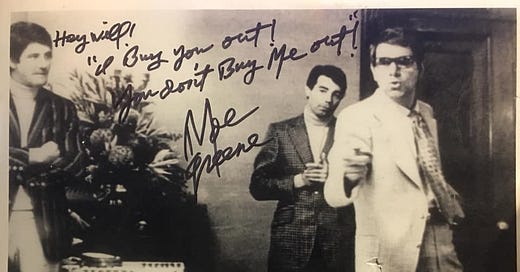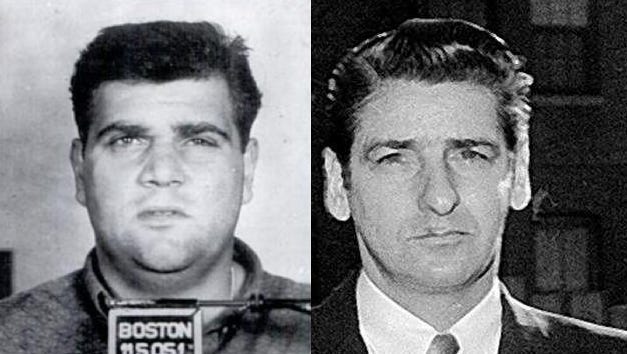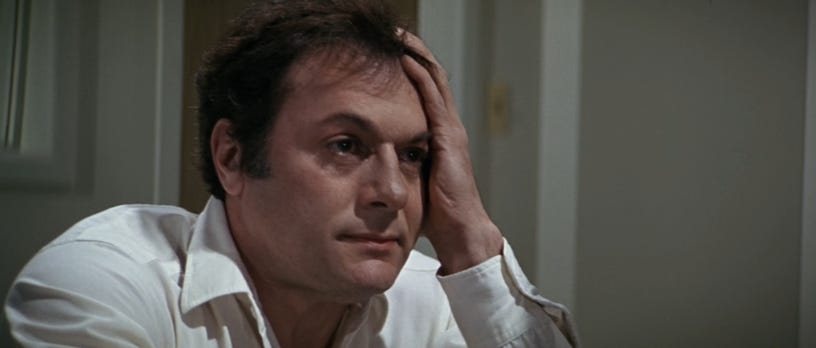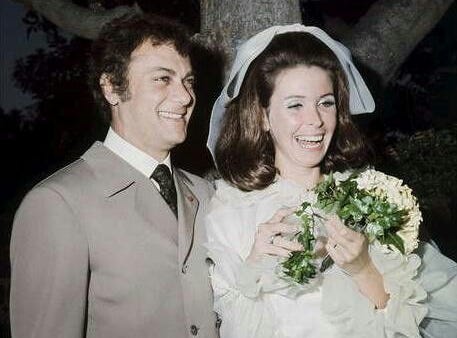Rocco, Tony and Cary
I’ve talked before about how, after doing my Random Roles with Alex Rocco in 2012, he contacted me by email because he was interested in my pitch to him about helping him write his memoir. Unfortunately, I’ve also talked about how the memoir never came to pass, but if you want to read a little bit more about all of that stuff, you can do so by clicking right here.
In addition to visiting his house and meeting with him and his wife, where he presented me with the photo you see below…
…Rocco and I also ended up having probably about a dozen phone calls, during which he regaled me with stories about his youth in Boston, his pre-Hollywood career as a petty thug working on the fringes of the Winter Hill Gang, and a plethora of tales about his acting career.
I’ve never publicly doled out any of the stories Rocco told me during those conversations, but it’s snowing here in Chesapeake, Virginia, and I suddenly found myself thinking about one of those calls, an occasion when Jenn answered the phone because I was out playing in the snow with our daughter, Ally. Rocco - who’d seen and cooed over the photos I’d sent him of my kid - said something like, “Tell Ally to throw a snowball for me!” Anyway, that bit of reminiscing led me to further recall my conversations with Rocco, and I decided that maybe today might be a good day to share a couple of his stories.
While we were doing these calls, I was also trying to take some of the material he was giving me and transform it into pieces that I thought might work well within the context of whatever book we might end up doing together, and in this instance, he gave me a story about two Hollywood legends where one led straight into the next. I’ve yet to transcribe some of these conversations - it was pretty raw when the project went south, as you can probably imagine - but I’ve got a few others that are in this kind of shape, so maybe you’ll end up getting another one sometime down the line. For now, though, at least you can get a feel for what this book could’ve been…and, for that matter, you can also get an idea of how easily I can take someone else’s stories, keep their voice, and shape them into something you could imagine seeing in a book.
And with that, I’ll turn things over to Rocco…
In 1968, I was just married, just into my thirties, and living in Laurel Canyon when I heard from my agent that they were looking for someone—preferably an unknown Italian—to play Albert DeSalvo in a movie about The Boston Strangler. If you look at my nose, you’ll see that I looked a hell of a lot like Albert DeSalvo. Meanwhile, Tony Curtis, who ended up getting the part, had to sit in the makeup chair for way too long while they actually copied my nose to make him look like DeSalvo.
Left: Rocco’s actual mugshot from his thug days — Right: Albert DeSalvo
For a little while, though, I was pretty close to being cast as the Boston Strangler, to the point of actually meeting with director Richard Fleischer at 20th Century Fox. As things got hotter and I got closer to the part, I started thinking, “Wow, I’m only out here for a few years, and now I’m gonna get this big movie with Henry Fonda and George Kennedy? Things are happening pretty fast for me!”
And then the phone rang.
I was holding the baby, so Sandy answered the phone, and after she did, she gave me a funny look and said, “He says it’s Tony Curtis.”
I thought, “Oh, it’s probably just one of my buddies on the doobie or something,” but I took the phone and said, “Hello?” As soon as he started talking, though, I knew that, yeah, it really was Tony Curtis.
“You don’t know me,” Tony said, “but I’m the Boston Strangler.”
Those weren’t exactly the words I was longing to hear, I have to admit, but the reason Tony was calling was enough to secure him as a class act in my eyes.
Tony knew he’d aced out an unknown for the part, so he asked me, “Could you come to my house for lunch tomorrow?” I said, “Sure!” What he wanted to do for me was to give me a scene in the film, for one thing, but he also wanted me to teach him and the rest of the actors the Boston accent and stick with them for the whole 16 weeks they were in production on the picture.
I ended up making a decent amount of money out of that deal, but Tony and I also got to be pretty close as a result of working together. When we were on the set, I really picked his brain for acting tips, because I was still just getting started and I really wanted to get into it. I figured this was a great chance to study acting and get advice from an honest-to-God movie star, someone whose work I’d been a fan of since before I left Boston. The greatest tip he gave me was that an actor’s gotta be like a prize fighter in the ring: you’ve just gotta just hang in there. He also said, “Any exposure will help your career. Never forget that.”
While we filming, Tony and I used to go to the Cave, a nightclub in Boston. One night, we saw this pretty girl, and he said, “Hey, Roc, see if you can bring her over!” She was a Boston debutante named Penny Allen (her real name was Leslie), so I introduced them. They ended up getting married and having a son named Nicholas. They also ended getting divorced, though, so I don’t know if I deserved a “thank you” for that or not.
As far as the rest of the people on the film, I enjoyed working with George Kennedy well enough, and most of the other cast were delightful as well, but I didn’t care much for Henry Fonda. I thought he was pompous. His dressing room was next to mine, and if he was in the doorway, I’d always say, “Oh, hey, Mr. Fonda,” but the most I ever got back was a crisp “hello” and nothing more.
On the flip side of the coin, I don’t think Richard Fleischer liked me very much. I remember I was late to the set one day, maybe by five minutes, and he chewed me out in front of the whole cast. My face was as red as a beet.
After the film wrapped, Sandy and I used to go to Tony’s house on Carol Wood Road to have dinner and just go hang out, but after awhile I got a little uncomfortable. Tony was more fun on the set, as it turned out. When we had dinners, with Larry Storch and a bunch of Tony’s other friends sitting around the table, Tony would be wearing a smoking jacket and acting differently than he did on the set. He was kind of a wannabe academic, talking about art and literature and this and that. The problem was that when he called and invited you over to his house for one of these get-togethers, he expected you to be there, which is why I started coming down with a nasty case of the flu on a regular basis. (I’ve never been very good at networking. It’s just not my thing.)
Of course, I still had to go to the wedding when Tony and Penny got married. I mean, I introduced them, after all. There was no way I could get out of that one.
As we stood in the foyer of Tony’s house, sipping on champagne, I told Sandy, who’d never been there before, “C’mon, I want to show you the library, it’s great.” That wasn’t just an excuse, either. Tony really did have a beautiful library, and when we went in there and found a fire roaring in the fireplace, we decided to just close the door behind us. It wasn’t exactly a hard decision: back in the foyer, there were Hollywood trade-paper columnists from this paper and that, along with a bunch of celebrities. But just as I was starting to give Sandy the grand tour, one of those celebrities burst into the library: Cary Grant.
He quickly closed the doors behind him, and then he looked at us and said, “Who are you two?”
“Well, Mr. Grant,” I began, “my name is Alex Rocco and this is my wife, Sandy.” I then gave him a quick summary of how I knew Tony and why I was there.
He said, “Well, why aren’t you out there?” meaning with the crowd.
“Ah, I’m just uncomfortable,” I said. “I feel kinda like a sneaker at a tuxedo affair.”
“Well, then, you’re sitting with me,” he said. “Now, when we go back out there, if anyone asks, don’t forget: you and Sandy and I, we’re all friends, and you came tonight so we could get together and catch up.” He had a whole story worked out. He didn’t want to be bothered by the columnists and the rest of the celebrities, so he figured this way he could just stick with us and we could stick with him, and it’d be win-win for all of us. And it was: whenever one of the columnists came sniffing around for a scoop, Cary just said sternly, “I’m sorry, but I’m with my friends Alex and Sandy. Now is not the time,” and they’d leave us alone.
We ended up going with Cary to the reception, taking his old Rolls-Royce, which was an absolutely luscious car. The function took place at the Daisy Club, which in those days was sort of a disco. Tony co-owned the place, and he made me a member, which was a real “in” thing to be. I remember there was a buffet of knockwurst and sauerkraut for the wedding dinner. Wedding receptions are supposed to be all classy and chic, but Tony Curtis was really just Bernie Schwartz from the Bronx. He didn’t care about all that shit. (Cary, meanwhile, sent his chauffeur to fetch him a bottle of the special brand of Scotch he preferred.)
The most memorable part of our meal with Cary came when we sat down at our table and Sandy—God love her—asked him, “Would you do one thing for me?”
“Anything, darling,” said Cary.
“Would you say, ‘Judy, Judy, Judy’?”
He said, “I’d love to!” And he did. But then he added, “I must tell you, however, that I never actually said that in any film!”
Isn’t that funny? It’s the phrase most often associated with him, but he never actually said it!
After we left the reception, we never crossed paths with Cary again, but that whole experience still remains one of the biggest thrills of my life.










